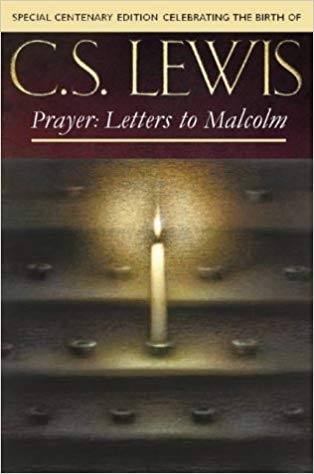Available in the Attic Library
C. S. Lewis
Prayer
Call No. 248.32 LEW
Barcode No. 504132
Reviewed by: John Woon, Family Connect 1 Small Group
C.S. Lewis’s last book is a sane, brilliantly imaginative approach to the problems of prayer. Published posthumously, it still stayed on the best-seller lists for many weeks.
C.S. Lewis prompts the reader to re-examine how esoteric-sounding questions about the nature of reality impact day-to-day experience of prayer. He wrote in his book:
But however badly needed a good book on prayer is, I shall never try to write it. Two people on the foothills comparing notes in private are all very well. But in a book, one would inevitably seem to be attempting, not discussion, but instruction. And for me to offer the world instruction about prayer would be impudence. (Pg 61)
This is not a book of instruction, but it does offer nuggets of truth, and it prompts the reader to re-examine his/her fundamental belief in prayer. For example:
- To think of our prayers as just ‘causes’ would suggest that the whole importance of petition prayer lay in the achievement of the thing asked for. But really, for our spiritual life, the ‘being taken into account’ or ‘considered’ matters more than the being granted. Religious people don’t talk about the results of prayer; they talk of the prayer being ‘answered’ or ‘heard’. They can bear to be refused but not to be ignored. In other words, our faith can survive many refusals if they are refusals and not mere disregards. But how would one reconcile with Matthew 21:22: ‘If you believe, you will receive whatever you ask for in prayer?’
- Regarding prayer, there exists on the Divine level a distinction with which we are very familiar with: that between the plan (or the main plan) and its unintended but unavoidable by-products. Whatever we do, even if it achieves its objectives, will also scatter round it a spray of consequences which were not its objectives at all. This is so even in private life. I throw out crumbs for the birds and provide, incidentally, a breakfast for the rats. The governing body of the college alters the time of dinner in hall; our objective being to let the servants get home earlier. But by doing so we alter the daily pattern of life for every undergraduate. To some, the new arrangement will be a convenience, to others the reverse. But we had no special favour for the first lot and no spite against the second. Our arrangement drags these unforeseen and undesired consequences after it. We can’t help this. The issue here is: does God function in this manner when answering our prayers?
This book also offers thought provoking insights into human nature and how it affects one’s prayer life. For example:
- Don’t you find that, if you keep your mind fixed upon God, you will automatically think of the person you are praying for; but that there is no tendency for it to work the other way around?
- Our prayers for others flow more easily than those we offer on our own behalf. If I pray that you may be given grace to withstand your besetting sin, all the work has to be done by God and you. If I pray for my besetting sin, there will be work for me. One sometimes fights shy of admitting an act to be a sin for this very reason.
- Apart from God we cannot speak at all. There are no words not derived from the Word, no acts not derived from Him who is perfect, and every sin is therefore the distortion of an energy breathed into us – an energy which, if not thus distorted, would have blossomed into one of those holy acts whereof ‘God did it’ and ‘I did it’.
In summary, this is a great book worth reading, pondering, and re-reading.

